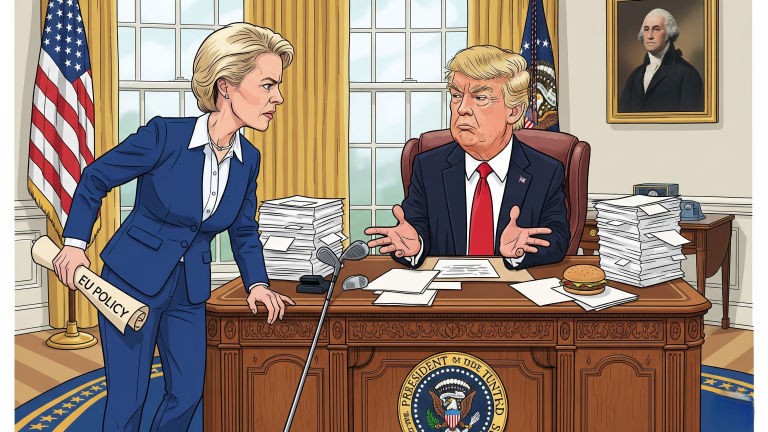High-stakes diplomatic mission is underway in Washington as European leaders, spearheaded by European Commission President Ursula von der Leyen, have joined Ukrainian President Volodymyr Zelenskyy in a united front to counter mounting pressure from U.S. President Donald Trump for a swift resolution to the conflict in Ukraine. This coordinated effort underscores Europe’s unwavering support for Kyiv’s sovereignty and territorial integrity, particularly as concerns rise that Trump’s push for a “peace deal” might entail significant concessions to Russia, potentially at Ukraine’s expense.
Arrival of von der Leyen, accompanied by German Chancellor Friedrich Merz and French President Emmanuel Macron, signals a significant shift in European diplomatic strategy. Instead of relying solely on bilateral engagements or indirect influence, Europe’s key players have opted for a direct and collective intervention in the U.S. dialogue with Ukraine. This move is widely interpreted as a direct response to the perceived lack of transparency and potential outcomes of Trump’s recent summit with Russian President Vladimir Putin in Alaska, which concluded without a ceasefire agreement and fueled anxieties about a potential deal being forged behind Kyiv’s back.
A United Front Against Perceived Pressure
Core of Europe’s concern lies in President Trump’s persistent rhetoric about the need for a rapid end to the conflict, often hinting at a willingness to accept solutions that might compromise Ukraine’s internationally recognized borders. European leaders, having witnessed Russia’s aggression and unwavering territorial ambitions, are determined to ensure that any resolution respects international law and Ukraine’s right to self-determination. Their presence alongside Zelenskyy in Washington sends a powerful message of solidarity and a clear indication that Europe will not endorse a peace deal dictated by Moscow or brokered without Ukraine’s full and willing participation.
United front also reflects a growing unease within Europe about the potential implications of a U.S.-brokered deal on the broader European security architecture. Many fear that ceding territory or offering significant concessions to Russia would not only embolden further aggression but also undermine the principles of national sovereignty and territorial integrity that underpin international order. For nations bordering Russia, the prospect of a weakened Ukraine and a triumphant Kremlin is a direct threat to their own security and stability.
Economic and Military Support Underpinning Diplomacy
Europe’s diplomatic backing of Ukraine is not merely symbolic. Over the past two years, the European Union and its member states have been at the forefront of providing substantial economic, humanitarian, and military aid to Kyiv. This support has been crucial in enabling Ukraine to resist the Russian invasion and has demonstrated Europe’s long-term commitment to the country’s survival. The continued flow of aid, coupled with stringent sanctions against Russia, underscores Europe’s strategic alignment with Ukraine and its determination to see a just and lasting resolution to the conflict.
Collective presence of von der Leyen, Merz, and Macron in Washington serves as a powerful reminder to the Trump administration of this European commitment. It highlights that any shift in U.S. policy towards Ukraine would not only impact Kyiv but also potentially strain transatlantic relations, given Europe’s significant investment in Ukraine’s future and its deep-seated concerns about Russian expansionism.
Navigating a Complex Geopolitical Landscape
Timing of this diplomatic push is also significant. It comes at a critical juncture in the conflict, with both sides potentially preparing for renewed offensives. Ukraine is keenly aware of the need to maintain international support, particularly from the United States, its largest single military donor. Europe’s active engagement aims to reinforce this support and ensure that the narrative surrounding a potential peace deal reflects Ukraine’s perspective and red lines.
However, navigating the complex geopolitical landscape, particularly with a U.S. administration known for its unpredictable foreign policy decisions, presents a considerable challenge. European leaders will need to carefully articulate their concerns and offer constructive pathways towards a sustainable peace that respects Ukraine’s sovereignty while also considering the broader implications for regional stability. The discussions in Washington are expected to be intense, covering not only the potential parameters of a peace deal but also the long-term security guarantees for Ukraine and the future of EU-Russia relations.
Ultimately, this coordinated European effort to back Zelenskyy in Washington represents a crucial test of transatlantic unity in the face of a major geopolitical crisis. While trade tensions and differing perspectives on certain foreign policy issues have occasionally strained relations between the U.S. and Europe, the conflict in Ukraine has largely served as a unifying force. The willingness of Europe’s top leaders to travel to Washington and stand alongside Ukraine underscores the shared values and strategic interests that continue to bind the transatlantic alliance.
Outcome of these high-stakes talks will have significant implications for the future of Ukraine, the stability of Europe, and the credibility of the international order. As President Trump presses for a resolution, the unified voice of Europe, supporting Ukraine’s right to determine its own future, will be a critical factor in shaping the path forward. The world will be watching closely to see if this collective diplomatic push can effectively counter the pressure for a swift but potentially unjust peace, and ultimately pave the way for a more secure and stable Europe.




